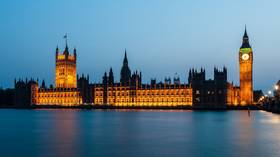‘No public benefit’: Scottish regulator blasts charity whose Integrity Initiative project was outed as anti-Russia psy-op

The NGO behind the Integrity Initiative – a project that claimed to fight “disinformation” but in reality appeared to be more of a covert British influence op – has been blasted by a new report for providing no “public benefit.”
The Integrity Initiative (II) claimed to be a tool aimed at educating policymakers on the dangers of fake news and disinformation. Yet, according to multiple rounds of documents released in 2018 by hacktivists calling themselves Anonymous, II operated Europe-wide anti-Russia influence campaigns, planting anti-Kremlin influencers in government, academia, media and the military.
The Integrity Initiative was bankrolled by the British government and defense ministry, and run by the Institute for Statecraft (IfS) – a Scottish-registered charity that claims to “advance education in the fields of governance and statecraft.” These goals, the leaked documents claimed, translated into schemes to hamper political appointments in Spain, smear anti-fracking activists, and contain the spread of the Russian orthodox church in Greece, among others.
In the most damning report I've seen from a charity regulator @ScotCharityReg rules that Fife-based Institute for Statecraft was effectively a sham charity that committed multiple breaches. IforS controlled failed propaganda entity the Integrity Initiative https://t.co/uZlaSQZL0opic.twitter.com/YasQRXhCtU
— Ian Fraser (@Ian_Fraser) November 4, 2019
A report published by the Scottish Charity Regulator (OSCR) has found that the Institute For Statecraft did not quite meet its stated goal as a charity. The investigation was opened in December 2018, with the OSCR saying that after a "security breach" there were media reports about charity "retweeting of party political material." It further received “concerns from third parties.”
The IfS mission – “to advance national and international security” – was deemed not to be a charitable purpose, the regulator noted.
One of its most significant activities, a project known as the Integrity Initiative, did not provide public benefit.
Charities, according to Scottish regulatory guidelines, must be politically neutral. In this case, the report stated, there was an attempt “to persuade the public to a specific point of view.” Aside from the Integrity Initiative’s political activities across Europe, the publication of biased material on its Twitter feed led the investigators to this conclusion.
The reports states that trustees of the charity "had failed to provide effective oversight o the charity's Twitter account, resulting in severe reputational damage to the charity."
While the feed was locked earlier this year, it is once again up and running, and pumping out anti-Russian tweets daily. This online campaign to counter supposed “malign influence” is just the public face of an operation that cost the British taxpayer roughly £2 million between 2017 and 2019.
Also on rt.com Integrity Initiative leaks: £10mn in UK govt funding for ‘network of NGOs’ to combat RussiaNot all of this funding went straight to the tip of the spear. The OSCR’s investigators were “concerned at the level of private benefit that a number of the charity’s trustees were gaining.”
Among the trustees that could be found on the IfS website, were former NATO adviser Chris Donnelly, former UK Defense Academy fellow Oliver McTernan, Latin American studies lecturer Celia Szusterman, and former British defense adviser and SAS officer Dan Lafayeedney.
With the exception of Szusterman, all trustees have a British military background.
The Institute for Statecraft has not been stripped of its charitable status. Following the OSCR investigation, the organization severed its ties with the Integrity Initiative, cut pay to its trustees entirely, accepted increased oversight and took on external help with governance. The OSCR declined to take further action, and says it will “monitor the charity’s progress.”
As for the Integrity Initiative, control of it has been handed over to “a non-charitable entity.” While its future work is unclear, the £2 million in funding it received from the British government is a small slice of the £100 million that the Foreign and Commonwealth Office has allocated to similar ‘info-war’ initiatives in a five year period since 2017.
Think your friends would be interested? Share this story!














